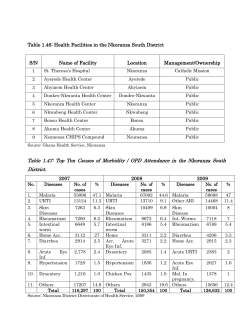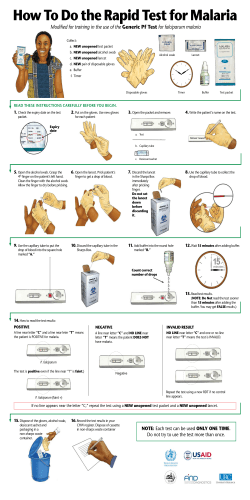
Mobile PCR Laboratory in Cambodia: developing migrant friendly
Mobile PCR Laboratory in Cambodia: developing migrant friendly health services and surveillance Presented by Nimol Khim, Lydie Canier, Didier Ménard Malaria molecular epidemiology unit APMEN VII Hoi An, Vietnam 25-27 March 2015 Mobile PCR Laboratory in Cambodia: developing migrant friendly health services and surveillance Nimol Khim, Lydie Canier, Didier Ménard Malaria molecular epidemiology unit APMEN VII Hoi An, Vietnam 25- 27th March 2015 Main challenges for malaria elimination Cambodian-Thai border is known as hotspot of malaria drug resistance. Cross border flows and national migrations are challenging for strategies aiming at target the malaria asymptomatic reservoir, especially TTT strategy: FSAT is based on active molecular detection of asymptomatic parasite carriers but the time delay between sample collection and treatment of positive cases ~ 8 days (PCR was performed in Phnom Penh) Objective Development a new, inexpensive, high-throughput diagnostic tool for identifying very low parasite densities in asymptomatic carriers applicable in the field: Mobile PCR Laboratory Truck with generator & batteries Mobile laboratory Mobile laboratory Mobile laboratory Work flow Sample collection 97.7% of results available in < 24h, allowing treatment of positive cases in < 48h 5 µl in 96-well plate DNA extraction Real-time PCR screening Negative Pv, Pm, Po Pf Positive Real-time PCR species Pf Pv Pm Po Canier et al, Malar J 2013 Results (Repellent project) The clusters for Pf, Pv and Po malaria appeared in the north of the province along the main river, while the cluster for Pm malaria was situated elsewhere. Malaria programme in the province should implement additional specific policies targeting households staying overnight at their farms outside the village, in addition to migrants and forest workers. Sluydts et al, Malar J 2014 Results (MSF study) “Low incidence village” : N= 246 samples “High incidence village”: N= 275 samples Total: 521 samples 5 µl DBS 50 µl blood 200 µl blood 1 ml blood Canier et al, Am J Trop Med Hyg 2015 Results (MSF study) Distribution of parasitemia (1 ml samples) Assessment of parasitemia using the Cts and standard curve 1 ml, N= 67 positives 5 µl DBS method less efficicent in detecting very low parasitemia Detected Undetected P= 0.036 P= 0.0024 P= 0.00065 200 µl 50 µl 5 µl PCR results according to the sampling volume Canier et al, Am J Trop Med Hyg 2015 Conclusion and perspectives Mobile laboratory allowing: Implementation of a robust, sensitive and rapid malaria diagnostic strategy in the field. Treatment of parasite carriers within 24-48 hours after sample collection. Collaborations Acknowledgements Institut Pasteur in Cambodia - Kim Saorin - Lydie Canier - Laura Berne - Pr. Vincent Deubel - Dr. Didier Fontenille CNM - Dr. Heng Somony - Dr. Siv Sovannaroth - Dr. Tho Sochantha - Dr. Lek DySoley APMEN - Arna Chancellor - Kate Bath - Pr. Maxine Whittaker Institute of Tropical Medecine - Dr. Vincent Sluydts - Dr. Lies Durnez - Pr. Marc Coosemans Thank you for your attention 14
© Copyright 2026











